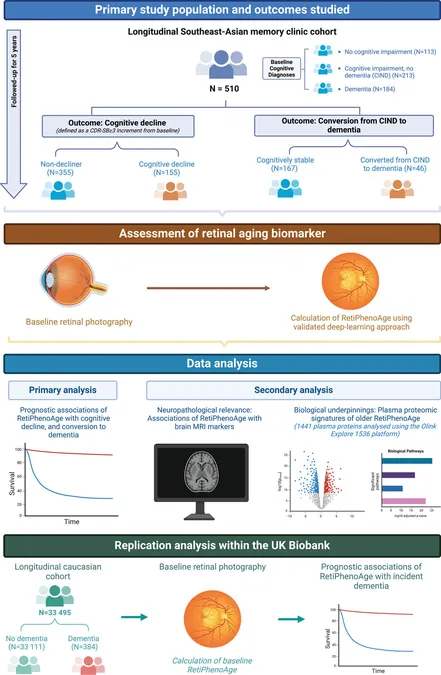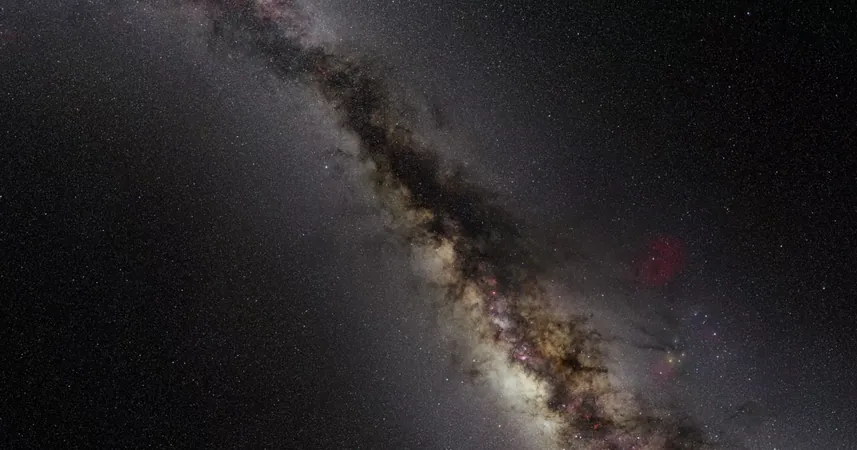
Revolutionary AI-Driven Eye Scan Could Predict Dementia Risk
2025-09-11
Author: Mei
AI Technology Turns Eye Scans into Dementia Predictors
A groundbreaking study from the Yong Loo Lin School of Medicine at the National University of Singapore showcases a game-changing advancement in dementia diagnostics. Researchers have revealed that artificial intelligence can analyze retinal photographs to assess an individual’s risk of cognitive decline and dementia—a first for Singapore, making waves in the realm of brain health management.
Introducing RetiPhenoAge: A Deep-Learning Breakthrough
Led by prominent figures, Professor Cheng Ching-Yu and Professor Christopher Chen, the research team developed RetiPhenoAge, a novel AI biomarker that estimates the biological age of the retina using standard eye images. This innovative approach aims not just to push medical boundaries but also to empower earlier detection of dementia.
Staggering Findings: Retinal Age Linked to Cognitive Risks
Analyzing data from over 500 participants in Singapore's memory clinics, researchers discovered that those with an elevated retinal biological age faced a staggering 25-40% increased risk of cognitive decline or dementia within just five years. Validation efforts on a larger scale involving over 33,000 participants in the UK Biobank echoed these alarming results, solidifying RetiPhenoAge's predictive power across diverse demographics.
Connecting the Dots: Retinal Health and Brain Aging
The study reveals that retinal aging reflects crucial biological processes tied to neurodegenerative diseases. Brain scans and blood markers corroborated RetiPhenoAge’s connection to neurodegenerative changes, offering a fresh perspective on utilizing retinal health as a marker for cognitive well-being. Prof Cheng asserts, "RetiPhenoAge provides non-invasive insights into biological aging, crucial for managing cognitive health before symptoms arise."
A Game-Changer for Dementia Screening?
Amid growing concerns over rising dementia cases worldwide, RetiPhenoAge stands out as a potential breakthrough for scalable and efficient screening tools. Prof Chen emphasizes the urgent need for accessible dementia diagnostics, hinting that this AI-driven approach could facilitate early detection and timely interventions in clinical practices.
Future Directions: Enhancing Health Care with AI
The implications of this study extend far beyond Singapore. The ability to integrate RetiPhenoAge into routine health checks through existing imaging technology could revolutionize early dementia detection globally. The research team is also focused on validating this biomarker in various Asian populations while evaluating its effectiveness in community health settings. Future initiatives led by Professors Cheng and Chen aim to trace intervention responses, be it lifestyle changes or medical treatments, further aiding in the fight against cognitive decline.
Conclusion: Pioneering a New Era in Dementia Care
This study not only marks a significant leap in digital biomarker development but underscores the power of merging AI with non-invasive imaging for solving pressing healthcare dilemmas. With increasing dementia prevalence, the timely response offered by RetiPhenoAge could ultimately change the landscape of cognitive health care significantly.



 Brasil (PT)
Brasil (PT)
 Canada (EN)
Canada (EN)
 Chile (ES)
Chile (ES)
 Česko (CS)
Česko (CS)
 대한민국 (KO)
대한민국 (KO)
 España (ES)
España (ES)
 France (FR)
France (FR)
 Hong Kong (EN)
Hong Kong (EN)
 Italia (IT)
Italia (IT)
 日本 (JA)
日本 (JA)
 Magyarország (HU)
Magyarország (HU)
 Norge (NO)
Norge (NO)
 Polska (PL)
Polska (PL)
 Schweiz (DE)
Schweiz (DE)
 Singapore (EN)
Singapore (EN)
 Sverige (SV)
Sverige (SV)
 Suomi (FI)
Suomi (FI)
 Türkiye (TR)
Türkiye (TR)
 الإمارات العربية المتحدة (AR)
الإمارات العربية المتحدة (AR)